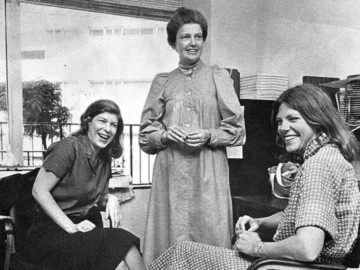Zoe Greenberg in The New York Times:
 When Nina Totenberg was a young reporter hustling for bylines in the 1960s, she pitched a story about how college women were procuring the birth control pill. “Nina, are you a virgin?” her male editor responded. “I can’t let you do this.” Such were the obstacles that Totenberg and the women journalists of her generation faced, largely relegated to the frivolous “women’s pages” and denied the chance to cover so-called hard news. But as Lisa Napoli’s “Susan, Linda, Nina & Cokie” chronicles, just as some women journalists were suing Newsweek and The New York Times over gender discrimination, in the 1970s, an upstart nonprofit called National Public Radio arrived on the scene offering new opportunities.
When Nina Totenberg was a young reporter hustling for bylines in the 1960s, she pitched a story about how college women were procuring the birth control pill. “Nina, are you a virgin?” her male editor responded. “I can’t let you do this.” Such were the obstacles that Totenberg and the women journalists of her generation faced, largely relegated to the frivolous “women’s pages” and denied the chance to cover so-called hard news. But as Lisa Napoli’s “Susan, Linda, Nina & Cokie” chronicles, just as some women journalists were suing Newsweek and The New York Times over gender discrimination, in the 1970s, an upstart nonprofit called National Public Radio arrived on the scene offering new opportunities.
NPR, unlike its well-resourced competitors, was eager to hire sharp, inventive, low-wage workers who couldn’t find jobs anywhere else — in other words, women. That decision launched the star-bright careers of Napoli’s subjects: Susan Stamberg, Linda Wertheimer, Totenberg and Cokie Roberts, and they in turn helped transform NPR from “the nation’s largest unlicensed Montessori school,” as an early study described it, to the vaunted institution it is today. (Finally allowed to do the stories she wanted, Totenberg became an iconic Supreme Court reporter.) Napoli, herself a reporter for print and radio who has written three other books, illuminates the terrifying, thrilling energy of NPR as start-up: “Not a day would go by without a tape reel being hurled like a Frisbee into the control room at the last minute, or breaking during playback, and it was never quite clear who’d show up for work or whether there’d be enough stories to fill the time.”
The book is a lesson in how the fringe project of one generation becomes the mainstream of the next.
More here.
